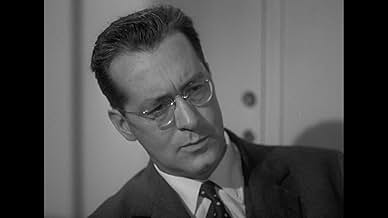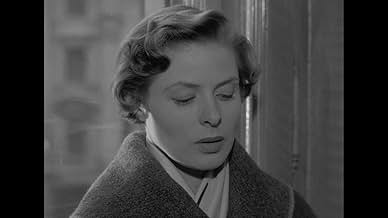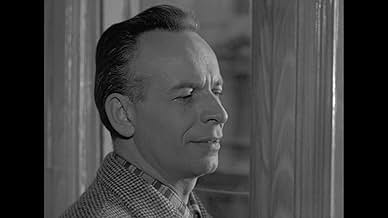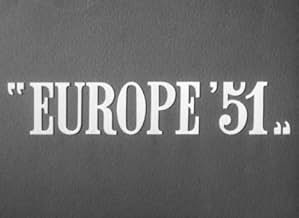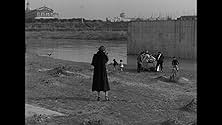CALIFICACIÓN DE IMDb
7.4/10
5.2 k
TU CALIFICACIÓN
Una mujer adinerada se obsesiona con el humanitarismo cuando su hijo pequeño muere después de suicidarse.Una mujer adinerada se obsesiona con el humanitarismo cuando su hijo pequeño muere después de suicidarse.Una mujer adinerada se obsesiona con el humanitarismo cuando su hijo pequeño muere después de suicidarse.
- Dirección
- Guionistas
- Elenco
- Premios
- 4 premios ganados y 1 nominación en total
Carlo Hintermann
- Extra
- (sin créditos)
Antonio Pietrangeli
- Psichiatra
- (sin créditos)
Rossana Rory
- Infermiera della casa di cura
- (sin créditos)
Opiniones destacadas
At first I wasn't sure what the point was of Europa '51. It's a movie that sneaks up on you because the early scenes are not at all about the same thing as everything that comes after. I kept thinking this was going to be a family drama, or some kind of political drama, but I was wrong. I quite like the development of this plot, because it shows how traumatic events can help shape our lives, and change who we are. At the start of this film I didn't care all that much for Ingrid Bergman's character, and I was a bit frustrated at the prospect of following her for the full runtime of this movie. Little did I realize, there were big changes on the way, and that transition impacted me even more because I saw the emotional journey of this character from where she began to where it all ended. I loved the arc of her story, and I was surprised how relevant it seems to the life we all lead every single day.
I think the most impactful thing to me in Europa '51 is that the story made me introspective. I always applaud any film that can get me to the point where I'm contemplating the way I live my own life. The movie shows how our world can be a dark and cynical place, but it also shows the power of love within all that darkness. I was emotional in the climax, not only because I was touched by the way the protagonist had come to view her place in the world, but also because of the way others reacted to her views. It's interesting to see a film tackle this major question of morality without taking it down a religious path. Instead it shows how even those in organized religion can be resistant to the very love and kindness that they preach. Needless to say, I was energized by Europa '51, and found it to be a powerful film that I'd love to explore more and will probably quote to others in the future.
I think the most impactful thing to me in Europa '51 is that the story made me introspective. I always applaud any film that can get me to the point where I'm contemplating the way I live my own life. The movie shows how our world can be a dark and cynical place, but it also shows the power of love within all that darkness. I was emotional in the climax, not only because I was touched by the way the protagonist had come to view her place in the world, but also because of the way others reacted to her views. It's interesting to see a film tackle this major question of morality without taking it down a religious path. Instead it shows how even those in organized religion can be resistant to the very love and kindness that they preach. Needless to say, I was energized by Europa '51, and found it to be a powerful film that I'd love to explore more and will probably quote to others in the future.
Europa 51 has a big heart, this much is clear. It's a story where Rossellini and his collaborators want to pose a basic question: what does someone have to do, like literally do with their own hands and wills and TIME, actually taking time and energy out of their days, to make a difference for people? The question may be surrounded by an, arguably, heavy-handed set-up, where Ingrid Bergman plays an ambassador's wife in Italy, and their son, a bit of a spoiled mama's boy (or, no, maybe he's just the sensitive sort, you pick, but either way not dubbed particularly well), dies accidentally. Bergman's Irene can't stand herself for what has happened - all her time being a dilettante and not spending enough time with her son made this happen - and she can barely go on.
Someone, a friend who has Communist ties, tries to convince her that perhaps it's time to make a change amid this time of Societal Upheaval (in caps) as political sides are being more sharply drawn. She sees how people suffer, and a day at a factory basically makes her completely light-headed (a montage of images, if memory serves, makes this clear). She wants to help. Maybe if she puts her energies to positive use, to help others, she can... what, find some solace? Alleviate her guilt? Or that now she can't be a mother to her son - and there's not much effort between her and her husband to find love again - so why not be a Mother to others? It's a little more difficult than that, of course, which is the riding factor of conflict in the narrative.
Bergman plays this character with all of the beats just right. Early on in those first scenes with her and her son you might wonder whether the writing isn't totally clear - IS she being a bad mother, or is he just whining, or is it a little 'much' determining either, who knows - but she plays it just right, this woman in her life who has it all and doesn't have to worry about much. This includes hearing conversations about class struggles (this before she sees them first hand) and can barely comprehend it. How Bergman channels grief is even better, showing us a face that has the life totally drained out, and she is always *listening* as an actress too to what's around her, and is a strong listener which is key. Ironic then that many of these, almost all of them, are speaking Italian and are dubbed over - this includes Giuletta Masina, who plays a local housewife.
Not all of the writing is superb here, at least for me. It's surprisingly melodramatic in its last quarter as Irene is looked at as being completely crazy (possibly, borderline, criminal) in how she's helping these people, which includes keeping one man evading prosecution in her home. I have to wonder if this story could work today, though a filmmaker like Scorsese, one of Rossellini's disciples, sort of made his version with Bringing Out the Dead - a protagonist who is haunted by death and wants to make a difference. It is a very hard thing to be saintly, or just be a decent person when there are many, many indecent things and people that go about in this world, certainly in this context post-war, post-fascist-cum-Communist Italy.
There's a lot to digest here, even if some of it may come off as dated or simplistic. But, once again as with Stromboli, the combination of a director with a clear, very moral message, and an actress giving it her ALL (and it's a case where Bergman does give one of her best performances from this period, even if the film isn't), that you can watch it and be wrapped up in this woman's drama.
Someone, a friend who has Communist ties, tries to convince her that perhaps it's time to make a change amid this time of Societal Upheaval (in caps) as political sides are being more sharply drawn. She sees how people suffer, and a day at a factory basically makes her completely light-headed (a montage of images, if memory serves, makes this clear). She wants to help. Maybe if she puts her energies to positive use, to help others, she can... what, find some solace? Alleviate her guilt? Or that now she can't be a mother to her son - and there's not much effort between her and her husband to find love again - so why not be a Mother to others? It's a little more difficult than that, of course, which is the riding factor of conflict in the narrative.
Bergman plays this character with all of the beats just right. Early on in those first scenes with her and her son you might wonder whether the writing isn't totally clear - IS she being a bad mother, or is he just whining, or is it a little 'much' determining either, who knows - but she plays it just right, this woman in her life who has it all and doesn't have to worry about much. This includes hearing conversations about class struggles (this before she sees them first hand) and can barely comprehend it. How Bergman channels grief is even better, showing us a face that has the life totally drained out, and she is always *listening* as an actress too to what's around her, and is a strong listener which is key. Ironic then that many of these, almost all of them, are speaking Italian and are dubbed over - this includes Giuletta Masina, who plays a local housewife.
Not all of the writing is superb here, at least for me. It's surprisingly melodramatic in its last quarter as Irene is looked at as being completely crazy (possibly, borderline, criminal) in how she's helping these people, which includes keeping one man evading prosecution in her home. I have to wonder if this story could work today, though a filmmaker like Scorsese, one of Rossellini's disciples, sort of made his version with Bringing Out the Dead - a protagonist who is haunted by death and wants to make a difference. It is a very hard thing to be saintly, or just be a decent person when there are many, many indecent things and people that go about in this world, certainly in this context post-war, post-fascist-cum-Communist Italy.
There's a lot to digest here, even if some of it may come off as dated or simplistic. But, once again as with Stromboli, the combination of a director with a clear, very moral message, and an actress giving it her ALL (and it's a case where Bergman does give one of her best performances from this period, even if the film isn't), that you can watch it and be wrapped up in this woman's drama.
It's a bit melodramatic, but up until Irene's final conversation with Cassatti the Commie, *Europa '51* is a very interesting film, first about a pampered rich woman's reaction to her son's death, then about the difference between windy Marxist propaganda and real compassion.
However, at that point, Rossellini's original idea takes over: He wanted to make a film about what would happen if a truly saintly person ever showed up in the modern world. And he had a very good idea of what would happen--or at least a very insistent one. The people here obviously behave the way they do solely to make the point Rossellini wants to make, even when their behavior doesn't seem very plausible. In defter hands, such manipulation can work. Here, though, you can see the tracks Rossellini has rather clumsily laid down to move the story where he wants it to go.
However, at that point, Rossellini's original idea takes over: He wanted to make a film about what would happen if a truly saintly person ever showed up in the modern world. And he had a very good idea of what would happen--or at least a very insistent one. The people here obviously behave the way they do solely to make the point Rossellini wants to make, even when their behavior doesn't seem very plausible. In defter hands, such manipulation can work. Here, though, you can see the tracks Rossellini has rather clumsily laid down to move the story where he wants it to go.
10EdgarST
After filming stories about the resistance of the Italian people during the Fascist and Nazi regimes, and the story of a German child against the barren landscape of Berlin after the war, Roberto Rossellini made a movie about Francis of Assisi and started a love and work relationship with actress Ingrid Bergman. In his evolution to works like 'The Rise To Power of Louis XIV', he made a series of melodramas with Bergman, of which 'Stromboli' and 'Voyage To Italy' are always considered the most important. Add to that list this fine drama, in which bourgeois housewife Irene suffers a transformation when confronted with the misery of those who had not been benefited with the European 'economic miracle.' Considered a saint by those she helped (Giulietta Masina included), Rossellini makes quite obvious that Irene reached that state by detouring from the usual roads she took as the wife of a prominent industrialist (Alexander Knox.) Not only has she a Marxist cousin who curiously does not preach his philosophy, but gives Irene advise whenever she talks about the misery she is discovering- but she also ventures into the slums, helps a single mother, a prostitute and a thief. The final section of the movie reminded me of 'María de mi corazón', a latter film written by Gabriel García Márquez, based on a real story. As in 'María
' there is neither opportunity nor chance to explain clearly what she's going through to husband or authorities, leading her to a dead end of desperation. Only sainthood will save her from the dehumanization around her.
Ingrid Bergman highlights in this compelling melodrama about a burgeois mother who becomes aware of the unfortunate social classes after the loss of a son. The film goes a step further and can also be read as the social portrait of the European status quo after the Great War. Some dialogs may appear evident and simplistic as far as ideology is concerned, but the impressive conclusion and the characteristic Rossellini's style makes it one of the most interesting films of his director and a valuable document about psychological war consequences which hasn't loose relevance.
¿Sabías que…?
- TriviaThe square Irene and Andrea drive to is the Campidoglio in Rome. The equestrian statue is of Marcus Aurelius, emperor and stoic philosopher.
- ErroresWhen Michele falls down the stairs, his parents rush to the car to get him to the hospital. When his mother finds him, she is wearing the white gown she wore at the dinner. When they first arrive at the hospital, she has a fur coat on. A few hours later, suddenly she has changed into a grey suit.
- Citas
Irene Girard: It is just that the love we feel for those closest to us, for those who should be and maybe really are dearest to us, suddenly isn't enough. It seems too selfish, too narrow. So, that we feel the need to share it, to make our love bigger until it embraces everyone.
- Versiones alternativasIngrid Bergman, Alexander Knox and the other English-speaking actors dub their own voices into English for the English version.
- ConexionesEdited into Damned! Daney (1991)
- Bandas sonorasBésame Mucho
Written by Consuelo Velázquez
Selecciones populares
Inicia sesión para calificar y agrega a la lista de videos para obtener recomendaciones personalizadas
- How long is Europe '51?Con tecnología de Alexa
Detalles
Taquilla
- Total a nivel mundial
- USD 9,381
- Tiempo de ejecución1 hora 58 minutos
- Color
- Relación de aspecto
- 1.37 : 1
Contribuir a esta página
Sugiere una edición o agrega el contenido que falta

Principales brechas de datos
By what name was Su gran amor (1952) officially released in Canada in English?
Responda
